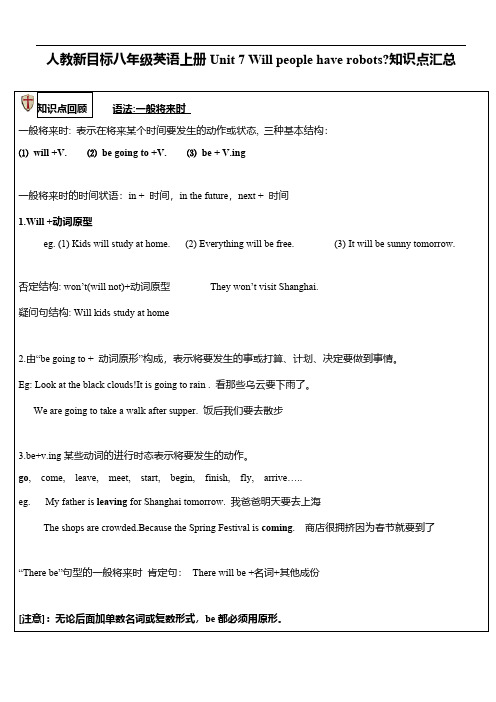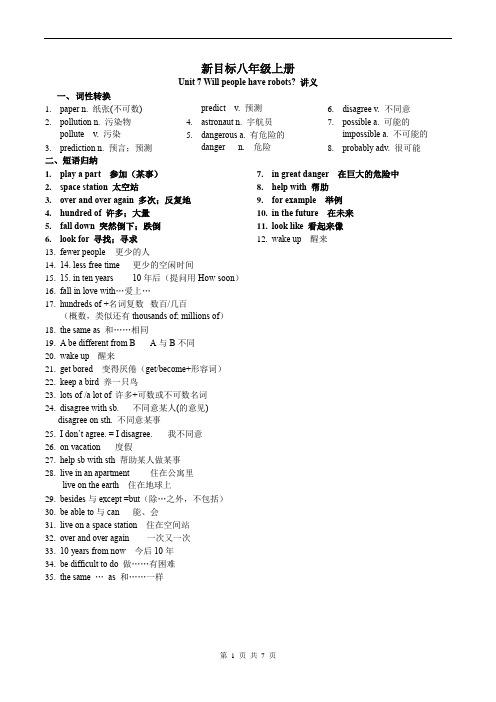最新人教新目标版英语八年级上册Unit7 Will people have robots公开课课件(3)
- 格式:ppt
- 大小:2.09 MB
- 文档页数:7

人教版英语八年级上册Unit 7《Will people have robots》教学设计一. 教材分析人教版英语八年级上册Unit 7 “Will people have robots” 主要围绕未来科技的发展,特别是机器人的应用进行展开。
本节课主要通过一个关于未来世界的对话,让学生掌握一般将来时的用法,以及如何谈论未来的一些预测。
教材还包括一些阅读材料和任务,旨在提高学生的阅读理解和口语表达能力。
二. 学情分析八年级的学生已经掌握了基本的英语语法和词汇,对一般现在时和一般过去时已经有了初步的了解。
但是,对于一般将来时的用法和如何准确地谈论未来的预测还需要进一步的讲解和练习。
此外,学生在阅读理解和口语表达方面还需要加强。
三. 教学目标1.学生能够理解和运用一般将来时。
2.学生能够通过阅读材料和对话,了解未来科技的发展趋势。
3.学生能够提高自己的阅读理解和口语表达能力。
四. 教学重难点1.一般将来时的用法。
2.如何准确地谈论未来的预测。
3.阅读理解和口语表达能力的提高。
五. 教学方法1.任务驱动法:通过设定一些与学生生活息息相关的情景,让学生在完成任务的过程中学习和运用语言。
2.交际法:通过模拟真实的交流场景,让学生在实际的语言环境中学习和运用语言。
3.合作学习法:通过小组讨论和合作,让学生相互学习,共同提高。
六. 教学准备1.教材和教学参考书。
2.多媒体教学设备。
3.与课程内容相关的网络资源。
七. 教学过程1.导入(5分钟)通过向学生展示一些机器人的图片,引起学生的兴趣,然后提问:“你们认为未来的人们会拥有机器人吗?”,让学生发表自己的看法。
2.呈现(10分钟)老师通过讲解和示范,向学生介绍一般将来时的用法,并举例说明如何准确地谈论未来的预测。
3.操练(10分钟)学生分组进行角色扮演,模拟真实的交流场景,运用一般将来时进行对话。
老师对学生的表现进行指导和评价。
4.巩固(10分钟)学生阅读教材中的阅读材料,理解并回答相关问题。


人教新目标英语八年级上册Unit 7 Will people have robots?一、重点单词paper n. 纸,纸张future n. 将来,未来environment n. 环境earth n. 地球,世界space n. 太空,空间human adj. 人的 n. 人already adv. 已经,早已disagree v. 不同意,持不同意见during prep. 在……期间pollution n. 污染,污染物pollute v. 污染planet n. 行星peace n. 和平even adv. 甚至,连,愈加dangerous adj. 有危险的,不安全的believe v. 相信,认为有可能possible adj. 可能的holiday n. 假期,假日不可数名词paper pollution environment water air time spacepollute动词----pollution名词predicte动词---prediction名词peace名词----peaceful形容词danger名词----dangerous形容词factory名词-----复数factories agree-----反义词 disagreefall---过去式fellinside----反义词 outsidepossible----反义词impossible probable形容词-----副词probably human----复数humans前面加an 的名词有astronaunt apartment engineer article二、重点短语on computers在电脑上on paper在纸上a piece of paper 一张纸in the future 在未来in 100 years在一百年以后live to be 200 years old活到200岁in people’s home 在人们家里in an apartment在公寓free time空闲时间in danger处于危险之中in the world 在世界上on the earth在地球上play a part in sth参与某事on a space station在太空站in space在太空look for寻找computer pro电脑编程员grammer over and over again反复地get bored感到厌烦的wake up醒来look like看起来像fall down倒塌,摔倒in the country在乡村,在国家take a train to school坐火车去上学human servants人类仆人fly rockets to the moon放飞火箭到月球in dirty or dangerous places在脏或者危险的地方do simple jobs 做简单的工作do same jobs 做同样的工作the same …as …和…一样…will be polluted 将会被污染in great danger 处于极度危险中as soon(quickly/fast) as possible 尽可能快的 if possible 如果可能what will happen 什么将会发生fly to +地点==go to +地点 by plane/airwill+动词原形将要做 fewer/more +可数名词复数更少/更多……less/more+不可数名词更少/更多……try to do sth尽力做某事have to do sth不得不做某事agree with sb同意某人的意见such+名词如此……play a part in doing sth参与做某事make sb do sth让某人做某事help sb with sth帮助某人某事There will be +主语+其他将会有……There is/are+sb./sth.+doing sth 有……正在做某事It is +形容词+for sb +to do sth 做某事对某人来说是怎样的三、重点句子:1. -----What will the future be like ?将来会是什么样子的?----- Cities will be more pollution.And there will be fewer trees. 将来城市会污染得更严重,树木将会少得多。



知识点回顾语法:一般将来时一般将来时: 表示在将来某个时间要发生的动作或状态, 三种基本结构:⑴will +V. ⑵be going to +V. ⑶be + V.ing一般将来时的时间状语:in + 时间,in the future,next + 时间1.Will +动词原型eg. (1) Kids will study at home. (2) Everything will be free. (3) It will be sunny tomorrow.否定结构: won’t(will not)+动词原型They won’t visit Shanghai.疑问句结构: Will kids study at home2.由“be going to + 动词原形”构成,表示将要发生的事或打算、计划、决定要做到事情。
Eg: Look at the black clouds!It is going to rain . 看那些乌云要下雨了。
We are going to take a walk after supper. 饭后我们要去散步3.be+v.ing某些动词的进行时态表示将要发生的动作。
go, come, leave, meet, start, begin, finish, fly, arrive…..eg. My father is leaving for Shanghai tomorrow. 我爸爸明天要去上海The shops are crowded.Because the Spring Festival is coming. 商店很拥挤因为春节就要到了“There be”句型的一般将来时肯定句:There will be +名词+其他成份[注意]:无论后面加单数名词或复数形式,be都必须用原形。
要点讲解Will there重点短语it will be difficult to do sth.不同意某人重点搭配重点短语Section A:1.play a part in saving the earth2.in 100 years3.on computers4.live to be….years old5.less free time6.world peace7.be free8.in great danger9.in the future10.move to other planetsSection B:1.fly rockets to the moon乘火箭到月球→fly up into the sky2.on a space station3.be able to…4.look for5.look like6.take a holiday7.the meaning of…..8.wake up….9.one day10.hundreds of11.over and over again12.do the same things as humans13.fall down14.seem impossible15. as a reporter语法聚焦----Will people use money----No, they won’t. Everything will be随堂练There ______a splendid football event(.I hope we'll study ______ home ______computers in the future.in;We should play a part in ______the party.organizingWe will have ______ free time next year than this year.Michael or Tony?______ ______ be a soccer match this weekend?.我们今天下午要为英语考试作准备。

人教新目标英语八年级上册Unit 7 Will people have robots?词句精讲精练词汇精讲1. duringduring是介词,意为“在……期间”。
例如:I went to see my uncle during my stay in Beijing. 我在北京逗留期间去北京看我叔叔了。
【拓展】during;in与for(1) during指“在……时间内,在……的期间”。
谓语动词常为表示持续性的动作或状态的动词,时间段前常有限定词(the; 物主代词等),表特指。
例如:He asked many questions during the three meetings. 在这三次会议期间,他问了许多问题。
(2) in意为“在……时间内”,一般情况下可以和during互换,用in时往往强调某一动作发生在某一时间段中的某一时间点;during既可表示“在整个时间段期间”,也可表示“某时间段内的某个时间点”。
例如:Mike put his hand up three times during/in the class. 在这节课内,Mike举了三次手。
(3) for意为“(时间)长达……”,强调时间由始至终,动作也贯穿这段时间的始终,可以和完成时连用。
强调持续时间的长短,回答how long的提问;而during则是指动作所发生的时间,回答when的提问。
例如:He stayed in Beijing for two years. 他在北京住了两年。
He swims every day during the summer. 夏天他每天去游泳。
2. in 100 yearsin 100 years意为“100年之后”,是由“介词in + 一段时间”构成,表示“在……之后”,多用于一般将来时。
对此短语提问时常用how soon。
例如:I will finish the task in two hours. 我将在两个小时后完成这项任务。

Unit 7 Will people have robots一、必背短语。
二、重点结构1.will+动词原形将要做……2.fewer/more+可数名词复数更少/更多……less/more+不可数名词更少/更多……3.have to do sth.不得不做某事(客观)must 必须(主观)4.agree with sb. 同意某人的意见5.There will be + 主语+其他将会有……=There be going to be…6.There is/are +sb./sth.+doing sth. 有……正在做某事7.make sb. do sth. 使某人做某事8.help sb. with sth. 帮助某人做某事9.What will the future be like ? 未来将会是什么样子?10.Which side do you agree with ? 你同意哪一方的观点?【教材内容解析】Section A1.Do you think there will be robots in people’s homes? (P. 49)本句是主从复合句,从句为宾语从句,如果do you think放在句中,则为插入语,放在特殊疑问词后面,结构为:疑问词+do you think+主语+谓语+其它。
例句:Which do you think is the best movie theatre?2.People will l ive to be 200 years old. (P. 49)live to be+基数词+years old意为“活到……岁”。
例句:In the story, people will live to be 500 years old.3.Will people use money in 100 years? (P. 49)“in+一段时间”表示“在……之后”或“在……之内”,通常用于一般将来时,常用来回答how soon的提问;“for+一段时间”则表示持续多长时间,用来回答how long的提问。

新目标八年级上册Unit 7 Will people have robots? 讲义一、词性转换1.paper n. 纸张(不可数)2.pollution n. 污染物pollute v. 污染3.prediction n. 预言;预测predict v. 预测4.astronaut n. 宇航员5.dangerous a. 有危险的danger n. 危险6.disagree v. 不同意7.possible a. 可能的impossible a. 不可能的8.probably adv. 很可能二、短语归纳1.play a part 参加(某事)2.space station 太空站3.over and over again 多次;反复地4.hundred of 许多;大量5.fall down 突然倒下;跌倒6.look for 寻找;寻求7.in great danger 在巨大的危险中8.help with 帮助9.for example 举例10.in the future 在未来11.look like 看起来像12.wake up 醒来13.fewer people更少的人14.14. less free time更少的空闲时间15.15. in ten years 10年后(提问用How soon)16.fall in love with…爱上…17.hundreds of +名词复数数百/几百(概数,类似还有thousands of; millions of)18.the same as 和……相同19.A be different from B A与B不同20.wake up醒来21.get bored变得厌倦(get/become+形容词)22.keep a bird 养一只鸟23.lots of /a lot of许多+可数或不可数名词24.disagree with sb.不同意某人(的意见)disagree on sth. 不同意某事25.I don’t agree. = I disagree.我不同意26.on vacation度假27.help sb with sth 帮助某人做某事28.live in an apartment住在公寓里live on the earth 住在地球上29.besides与except =but(除…之外,不包括)30.be able to与can 能、会31.live on a space station 住在空间站32.over and over again 一次又一次33.10 years from now 今后10年34.be difficult to do 做……有困难35.the same …as 和……一样三、重难点深度解析1. Do you think there will be robots in people's homes? 你认为将来人们的家里会有机器人吗?Do you think...? 结构通常用来征求对方的意见或看法,后面接宾语从句,从句用陈述语序。


姓名:班级Unit 7 Will people have robots?Section A本课重点1.will构成的一般将来时态的肯定句、否定句、一般疑问句及回答2.做预言,用will来讨论未来发生的事情3.用will来表达将来时,并能熟练运用there be 句型表达将来时4.明确区分可数名词和不可数名词;正确使用more,less,fewer 本课难点1.用will来表达将来时,并能熟练运用there be句型表达将来时2.明确区分可数名词和不可数名词;正确使用more,less,fewer 常考句型 1.Kids won't go to school. They will study at home on computers.2.People will live to be 200 years old.3.—Will people use money in 100 years?—No,they won't. Everything will be free.4.I think there will be more pollution.5.I don't think so.I think there will be fewer trees.6.It's a book about future.7.What will the future be like?8.Will we have to move to other planets?9.Everyone should play a part in saving the earth.一、单项选择1.Lingling and I __________ to Lao She Teahouse last night.A.go B.are going C.went D.will go2.There _______ a football match on TV this evening.A.will have B.will be C.has D.is going to have 3.—What's your aunt's plan for tomorrow?—She _________ to the theatre to see the Beijing Opera.A.go B.will go C.went D.goes4.When the rain ________, we’ll go home at once. But no one knows when the rain ________. A.stops; stops B.will stop; will stopC.stops; will stop D.will stop; stops5.If we do nothing to protect giant pandas, there ________ no more giant pandas in the future. A.will have B.will has C.will be D.will be going to have 6.—Will you go to the cinema with me tomorrow?—Sorry, I _____ skating with Tom.A.go B.goes C.went D.will go7.What will the future ________ like?A.is B.are C.am D.be8.— Will there be more schools in 20 years’ time?—________. I think students will study by Internet at home.A.No, there aren’t B.Yes, there are C.No, there won’t D.Yes, there will 9.The air ________ here makes me uncomfortable.A.discussion B.relationship C.pollution D.information 10.——How soon will he come back? ——___________ two days.A.Before B.After C.In D.For二、用所给词的适当形式填空。

Unit 7 Will people have robots?Section A 1 (1a-2d)一、教学目标:1. 语言知识目标:1) 能掌握以下单词: paper, pollution, prediction, future, pollute, environment, planet, earth, plant, part, play a part2) 能掌握以下句型:① What will the future be like?Cities will be more polluted. And there will be fewer trees.② Will people use money in 100 years?③ Will there be world peace?④ Kids will study at home on computers.⑤ They won’t go to school.2) 能了解以下语法:will + 动词原形来表达一般将来时态。
3)学会表达自己对未来的看法;学会谈论自己未来的打算。
2. 情感态度价值观目标:通过引导学生展望未来,及对未来生活的设计,来达到前景教育的目的,同时也通过对前景的设想,让学生在潜移默化中反省自己的现状,使之对目前的学习、生活习惯作适当的调整,并不断的改善自己的现状,使学生的理想观和价值观更为科学,更具发展价值。
二、教学重难点1. 教学重点:1) 学习掌握一般将来时态的意义和结构。
2) 掌握There be句型的一般将来时态的结构。
2. 教学难点:掌握more/fewer;more/less的用法。
情态动词will + 动词原形来表达一般将来时态。
三、教学过程Ⅰ. Lead-in1. 在大屏幕上向学生展示一些机器人的图片,让学生们说出谈论自己的未来的工作,对工作的打算等:What do you want to be when you grow up?Ss: I want to be a scientist.T: How are you going to do that?Ss: I’m going to study science hard.….2. 学生们根据图片来引导出机器人这一话题。

教学设计Unit 7 Will people have robots ?Section A 2a—2d(第二课时)【学习目标】1.学习新单词和短语。
(P50-p51)2.继续学习一般将来时态。
(there be 的一般将来时: There will be )3.训练听力。
【课前导学】1.拼读单词和短语。
(P50-p51)2.找出新词语:更少的污染更多的空闲时间更少的树更少使用水参与一本关于将来的书_____________________ 处于极大的危险中____________ 搬到其他星球________________________ 居住在地球上_______________ 挽救地球____________________________ 3.Grammar(语法)(1).对表示数量的形容词比较级的运用:much(多的)-more little(少的)-less修饰不可数名词;many(多的)-more few(少的)-fewer修饰可数名词。
less + 不可数名词less money , less timefewer+ 可数名词复数fewer books , fewer carsmore+可数名词复数\不可数名词more books,more water(2) There be(有…)句型的一般将来时;There will be+名词+其它【课堂导学】【课前热身】复习上课时学的一般将来时的构成和用法。
任务1. (2a)学生听并圈起你听到的单词。
小组合作翻译句子。
(个人抢答)任务2. (2b) )学生听并打✔你听到的预言。
(个人抢答)任务3. (2c) 两人一组操练对话。
任务4. (2d) Role-play the conversation1.阅读对话并回答下列问题。
1) What will the future be like in the book? _____________________________2) What can people do?______________________________________12.把下列短语和句子翻译成汉语。

Unit 7 Will people have robots?(Section A 1a-2c)一、教材分析:(一)、本节教材的地位和作用本课是新目标英语八年级上册的第七单元的Section A 的第一部分,本节教材所涉及内容在中考中占有相当重要的地位。
本节教材围绕着“将来发生的事”展开,要求学生学习和运用“will+v(原)”构成的一般将来时态。
本课教学内容与学生的实际生活相关,可以利用学生的想象,引导学生运用简单的英语来描述将来的生活和事物。
在学习活动中,学生通过对将来发生的事情的描述,促进学生对美好未来的憧憬。
(二)、教学目标:(1)知识与技能1.指导学生学习有关将来要发生的事情的表达及语法知识点“一般将来时” 。
2.培养学生的口头表达能力、阅读理解能力和写作能力。
1. 学习有关的单词及词组:robot, paper, pollution, tree, subway, computer, will, won ’ t ,they’ll, fewer, be free, on paper, live to be, in 100 years, etc. 2. 学习重要句型:(1)People will have robots in their homes. (2)Will people have robots?. (3)Kids won’ t go to school. (4) There will be less pollution. 3. 掌握语法点:The Simple Future Tense ( 一般将来时) (1)教师自制的多媒体课件;(2)上课环境为多环境。
(2)情感目标:通过学生对自己in five years 的展望,设想自己五年,十年,甚至是二十年后的生活,贴近学生生活实际,符合学生好奇的心理,激发学生浓厚的学习兴趣。
(3) 学习策略:通过任务型的教学,让学生学会自主学习,归纳总结,培养主动学习的能力。

《Unit 7 Will people have robots》教案Teaching goals:1.学习一般将来时态的相关知识,学会对未来进行预测.2.will 构成的一般将来时态的陈述句、否定句、疑问句及回答.3.There be 句型的一般将来时.4.more , less , fewer 的用法.5.Words&phrases: robot, paper, less, fewer, future, poll ution, play a part, on computers, etc . Important and difficult points :1.will构成一般将来时态的句式。
2.There be 句型的一般将来时态。
3.more , fewer , less 的用法。
Period 1Teaching procedures:Step 1 Leading in1.play an English song.2.Greetings:welcome to school.3.Let a student make a duty report.4.To set the scene increase Ss’vocabulary.Where are the two boys?They are talking about the future.Can you guess what will happen in ten years?Collect the Ss’ answers and say something about their predictions .Step 2 Pre-task1a .1.Look at the picture :How will the world be different in the future ,100 years from now ?We’re going to talk about sth in 100 years .2.Read each predictions to the class .Explain the new vocabulary .3.Read the instructions .Make sure Ss know what they should do .4.Do i t by themselves .5.Talk about the answers with the class .Explain :一般将来时态构成: will / be going to +动词原形Step 3 While-task1b .1.Practise reading the six predictions .2.Read the instructions to Ss .Circle the things you hear on the recording .3.Play the tape twice .4.Play the tape a third time .At the same time ,check the answers .1c .1.Pay attention to the dialogues .2.Read the dialogues fluently .3.Pairwork .Work in pairs to make predictions according to the sample .4.Ask several pairs to share their conversations to the class .2a & 2b .1.Read the predictions .2.Read the instructions and point out the sample answer .3.Play the tape twice .Ss circle the word they hear in each sentences: more , less , fewer .4.Check the answers .学生探究: less , fewer 的区别。